This article is about our new Lab puppy’s first night home and the routine we’ve followed in our puppy’s first two weeks.
I picked up puppy Rip on July 23 so we’ve had him about two weeks at the time of this writing.
I’m used to weimaraners, so this little Lab puppy seems so laid-back and calm! He actually takes long naps!
The first two weeks with our new puppy have been fun but also stressful!
If you’re overwhelmed with your puppy (and tired!), don’t worry about getting everything perfect. We all make mistakes and puppies are very adaptable.
Try to get into somewhat of a routine as quickly as you can and adjust as you go.
For example, I chose not to have my puppy sleep in my bedroom the first two nights but then I decided to move his kennel next to my bed so I could hear him easier.
Here are some ideas on how to make the first night with your puppy go as smoothly as possible!
Your Puppy’s First Day Home
If possible, I recommend you pick your puppy up on a Friday or on a day when you can take a few days off from work. This will help everyone adjust to a routine – mainly the bedtime routine, kennel training and potty training.
All of these things take a few days or weeks to click but it’s easier to have a few days off from work, if possible.
I got my puppy from a breeder out of state, so I chose to fly to Minneapolis to pick up my puppy. He and I stayed with my parents for two nights because they live near the breeder. Then we flew home on Sunday.
I wrote an article on how to fly with your puppy. It was a fairly easy process.
Puppy potty training – lots and lots of potty breaks the first day
Once you get home, I recommend a potty break first thing! Lots of praise, “Good girl!” And probably again after about 20 minutes!
I know it sounds excessive, but on your puppy’s first day home, I would take her out every 30 minutes whenever she is awake. This means less accidents during the first few days while teaching your puppy to go potty outside.
Take your puppy out after she plays and after she wakes up from a nap.
Basically anytime there is a “transition” from one thing to the next, take her out to go potty!
For example, if they puppy was just running and playing with a toy and then gets distracted and sniffs, pick her up and take her outside.
For more details, see: How long does it take to potty train a puppy?
Introducing your puppy to your adult dog
It’s best to introduce your adult dog to your new puppy outside in a neutral area vs. in the doorway of the house. Have another adult help you, if possible.
When we introduced our adult dog Remy to puppy Rip, my husband had Remy on a leash while I held the puppy. I stood with the puppy’s back and butt side to Remy so he could sniff him a bit before I introduced them face to face.
Keep in mind, some dogs are more reactive while on a leash, however.
I was confident my dog Remy would be friendly and accepting of the puppy and I was correct. He loves the puppy and is great with him! We’ve had one minor incident so far over a treat on the ground where I was reminded dogs can be dogs. But other than that, these two are best buds.
The introduction was not so easy 5 years ago when we introduced 8-week-old Remy to our senior dog at the time. Our senior dog was NOT happy with the puppy and was not accepting at all. In fact, he would growl or snarl ferociously if the puppy got too close.
So, just be very aware and take things slowly.
If you have concerns about the introduction, here is my article on how to introduce your adult dog to your puppy.
I also wrote this article on aggression between dogs in the same house.
If you have a cat, it’s probably easier to do that introduction later on to reduce stress and commotion for everyone, but it’s up to you. Or, let the cat come meet the puppy on her terms, when she’s ready.
Let your puppy explore a little
Your puppy is just a baby and she might feel overwhelmed or scared in a new environment. On the other hand, she may be feeling confident and eager to play and explore.
My weimaraner puppy Remy was feeling overwhelmed when we brought him home at 8 weeks old, but Lab puppy Rip was ready to run and play immediately!
Once you head inside, there’s no need to show your puppy around the whole house, just the immediate area that she will be in. For example, the kitchen with a baby gate.
Let her walk around and sniff that room for 20 mins or so. Show her a few toys and offer her a little food and water. She may be too nervous to eat or she might practically inhale it! They are all different.
Head out for another quick potty break after 20 mins or right away after your puppy eats!
Introduce your puppy to her kennel/crate
Once your puppy has had some time to explore and play and had a little food, she is likely going to be feeling tired.
This is a great time to introduce her to her new kennel or crate.
You can leave the door of the crate open and put a soft bed or blanket in there with a few toys. Toss a treat in and your puppy might actually go in on her own and settle in.
It helped Rip to have a small blanket from his breeder that was with the momma dog and litter mates. He still sleeps with that blanket in his kennel.
On Rip’s first evening home, he walked into his travel crate on his own and would have slept for a whole hour! We ended up waking him up because we wanted him to be good and tired for bedtime later!
We had him sleep in the travel crate so he would be used to it before his big flight!
I’m now transitioning him to a large, wire crate for more space.
See more details here: Puppy kennel training
8-week-old puppy’s first night home
The first few nights can be challenging because most puppies will cry and you won’t get a lot of sleep!
Where should my puppy sleep?
For your puppy’s first night home, it’s best to have him sleep in a kennel/crate at night. You can have it right next to your bed or in another room.
At first I put Rip’s kennel outside of my bedroom and left my door open so I could hear him if he cried. I soon realized it was just easier to have his crate right by my bed, so that’s what we do now.
In our case, Rip did not cry at all when I put him in his kennel for the first night (amazing!). I think he was just so tired from being in a new place with new people.
However he started to whimper at about 2:30 a.m. so I took him out for a quick potty break. Good boy! Then back in the kennel.
He cried for about 5 minutes and then fell asleep again until my mom got up with him for the day at 5 a.m.
Does an 8-week-old puppy need a potty break in the middle of the night?
On your puppy’s first night home, he may or may not need a potty break in the middle of the night.
I know it’s hard to tell if your puppy is crying for attention or crying because he has to go potty.
My rule of thumb is to calmly take the puppy outside for a bathroom break if he is crying. I try to keep the lights dim or not even turn them on, if possible.
I don’t give my puppy much attention and certainly no playtime. Just a quiet, “Good boy” when he goes potty. Then, I put him back in the kennel.
If he cries again, I ignore him. Usually, the puppy will fall back to sleep in a few minutes.
Do Lab puppies need a potty break in the middle of the night?
My Lab puppy has needed a potty break in the middle of the night up until last night, but every puppy is different.
Rip’s breeder said it’s normal for a 7-9 week old Lab puppy to need a potty break in the middle of the night but by 12 weeks old or so they should definitely NOT need a 2 a.m. potty break anymore.
If your Lab puppy is crying in the middle of the night at 12 weeks old, then the puppy has trained YOU, our breeder says!
So … my puppy Rip is now about 10 weeks old. Last night was night #14 and he finally slept from 9:30 p.m. to 5:10 a.m.! Over 7.5 hours!! Woo hoo!
Let’s hope he can do so again tonight!
Should you let your puppy sleep in your bed the first night?
I don’t recommend allowing your new puppy to sleep in the bed with you until she is fully potty trained.
Using a kennel for bed time until that point will help the puppy with potty training, prevent her from chewing your stuff and develop a little independence.
Although I do not choose to allow any of my pets to sleep in my bed, it’s fine if you choose to do so. Just wait until your puppy is potty trained.
Think of it as a privilege your puppy will need to earn. Another option is to eventually allow her to sleep out of the crate but on her own dog bed next to your bed.
If you train your puppy to sleep in her crate at night, you are building a confident, well-adapted puppy. She will be less likely to develop separation anxiety. Instead, she will learn to settle down and just “be.”
You are also helping her with potty training because she is unlikely to go potty in her crate.
See my article on what to do if your puppy is having accidents in her crate.
Why do puppies cry at night?
Your puppy is likely to whine and bark the first couple of nights because he is in an unfamiliar place without the usual comfort of his mom and litter mates. His routine is off and his whole world is turned upside down!
However, it does not take long for a puppy to adapt to the new routine if you stick to a consistent routine.
Here is my detailed article: How long do puppies cry at night?
How much do puppies sleep?
Puppies sleep a lot! Puppies sleep 18-20 hours or more in a day! Adult dogs also sleep a lot, as you have probably noticed.
My Lab puppy will play for about an hour and then sleep for 2 hours. He will voluntarily go curl up somewhere and sleep on his own. It is so nice!
Every puppy is different, however. My weimaraner puppy never fell asleep unless I put him in his kennel with a Kong. Then, he would often crash.
In the evenings, many puppies will have a “wild hour” from about 6:30 to 7:30 where they are racing around biting everything and going crazy. Then, they’re pretty much ready to crash for the night after that.
See my article: Why is my puppy so crazy in the evenings?
Start puppy kennel training the first night home
I go into the details of kennel training in this article, but wanted to mention it briefly here.
A kennel will keep your puppy safe and out of trouble when you can’t supervise such as while you’re sleeping. I use a fold-up wire kennel but plastic also works.
I’m not here to convince you to use a kennel, but it makes life easier. Another option is to use a baby gate to block off a certain area. Or you can use an ex-pen or puppy play pen. It’s best not to give your puppy too much freedom at first.
Plan ahead and put your puppy’s kennel where you want your puppy to sleep the first couple of nights. That might be in your bedroom at first, and then you can move it to another room later if you choose.
Think about how you will keep your puppy confined to a smaller area of your home during the day as well. You can do that by using a gate to close off certain areas.
Puppies do best with less freedom in the beginning.
Before your puppy’s first night home, do your best to puppy proof in advance by picking up or moving anything that might be tempting to your puppy such as children’s toys, shoes, low-hanging decorations, chargers and cables, etc.
How much should I feed my puppy?
Each puppy is different. I would ask your puppy’s breeder or the shelter for a general recommendation.
For my puppy’s first night home, I decided to offer him 1/2 C. of dry food the first evening. He was actually too distracted to eat (not a normal Lab, I know!). We offered him the same 1/2 C. the next morning and he slowly ate most of it.
You might have a puppy that devours her food in one breath (Remy!) or you might have a picky eater. In most cases, it’s better to offer your puppy 3 smaller meals per day vs. 1 or 2 larger meals.
Rip is a 9.5 week old Lab puppy. He weighs 10.8 pounds and currently eats about 1.5 cups of dry food a day over three meals.
He is a slow, slow eater. I know, can you believe it? He doesn’t even care much for string cheese or other goodies as treats. But he is a healthy weight.
Basic puppy supplies for puppy’s first night home
I’m sure you already have your puppy supplies, but just in case, here are the basics to have for your new puppy’s first night home:
- 6-foot nylon or leather leash
- Basic collar & a tag w/ your phone #
- Toys such as a stuffed toy, a squeaky toy and a rubber chew toy
- Puppy food (specific to puppies)
- A kennel/crate for your puppy. I like the fold-up wire kind but plastic also works.
- Cheap bedding in the kennel like towels or a sheet.
- Something to chew like thin bully sticks
- Simple baby gate
Other puppy supplies that are nice to have:
- A towel or toy from the breeder/shelter that has been with your puppy’s littermates
- Heartbeat toy for comfort at night
- Poop bags
- A dog bed or blanket
- Wider variety of toys like a snuffle mat, balls and tug toys
- Variety of chews like Kongs, pigs ears or hooves
- Soft training treats
- Treat pouch
- Long 30-ft leash
- Stainless steel (chewproof) dog bowls
- Chewproof leash
- Go-to resources such as dog training books, podcasts, blogs or videos
- Bitter apple spray to deter chewing
- I personally don’t use pee pads, but many people do
Also see this article for ideas: New puppy checklist
How was your puppy’s first night?
Let me know how your puppy’s first night home went! Do you have any suggestions or questions, let me know in the comments! We are in the thick of potty training, kennel training and sleeping through the night, right now, so I understand the struggle!
-Lindsay

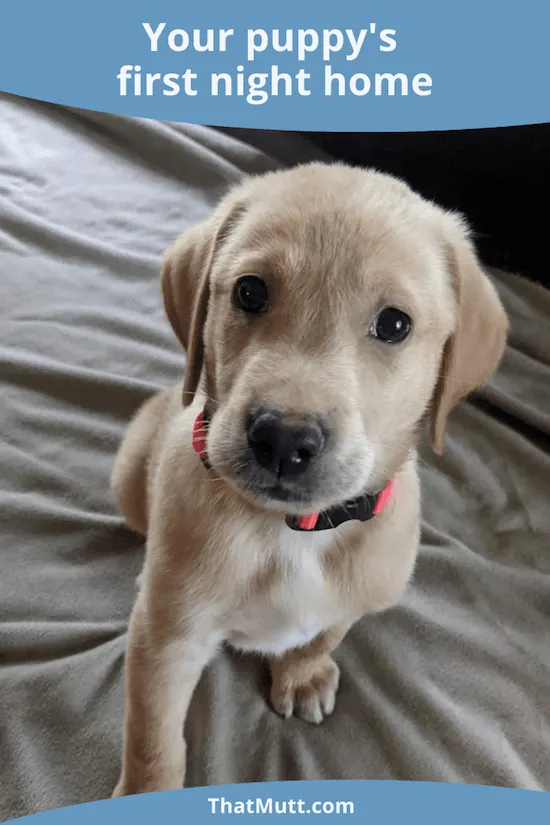
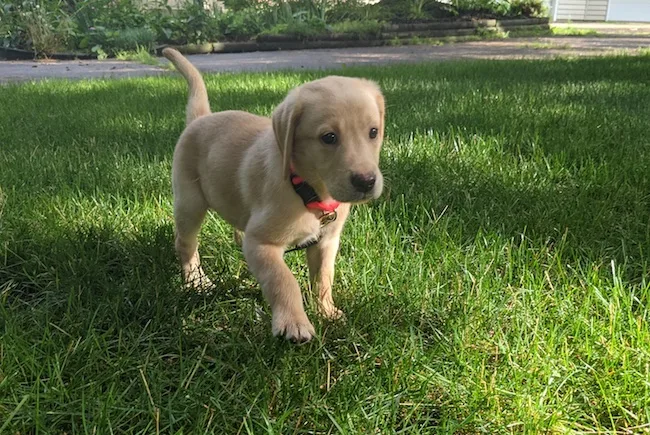
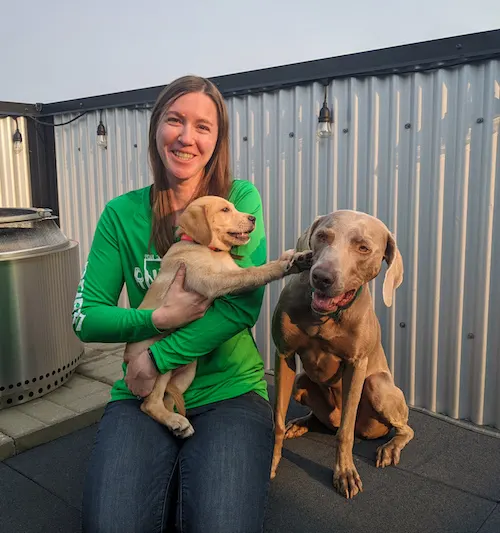
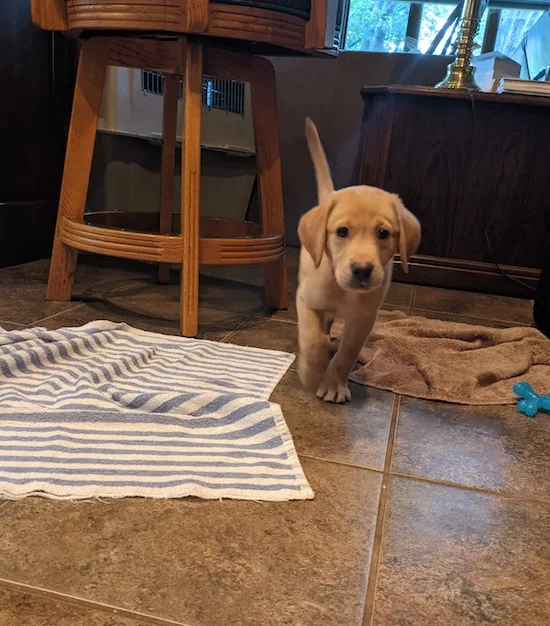
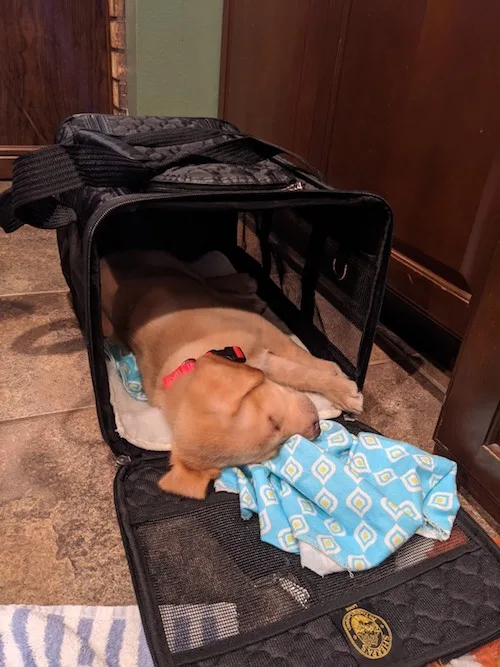
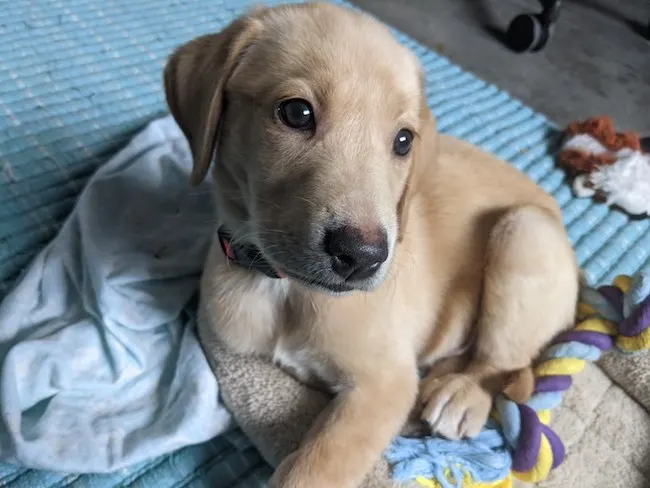
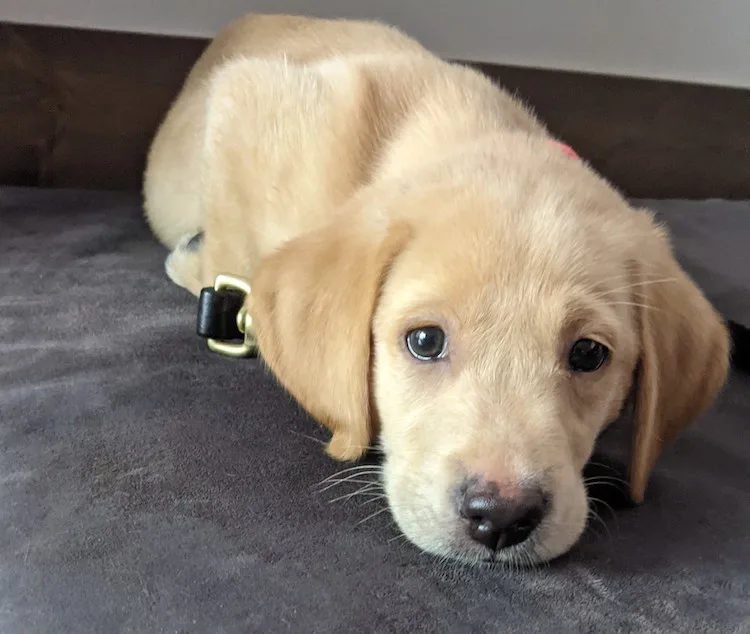
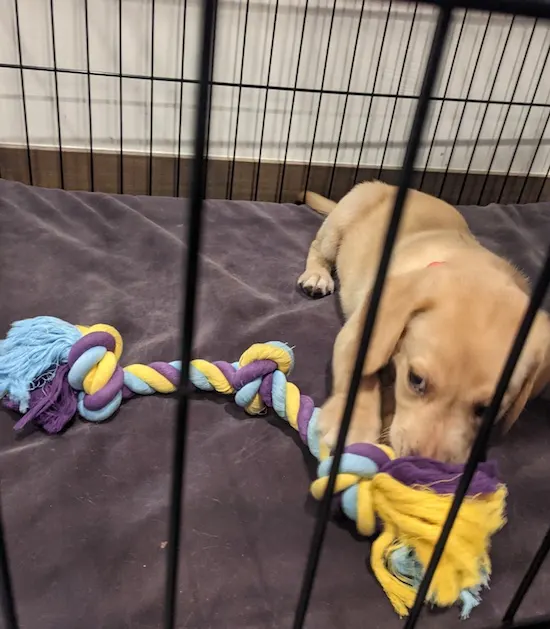
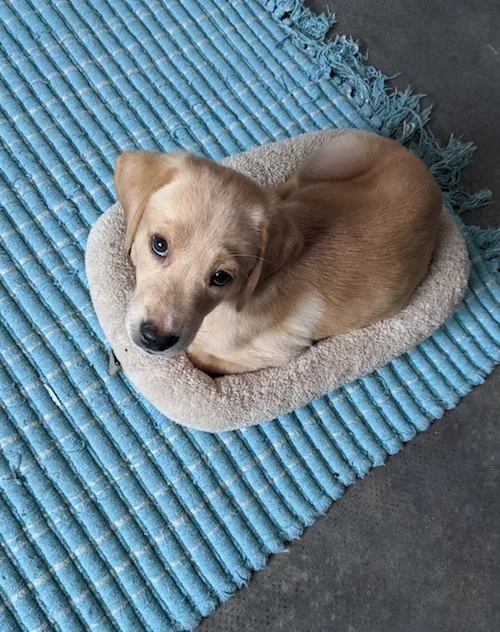
stalbans digital printing
Friday 24th of June 2022
I think this is useful article for caring puppies. It is about our new Lab puppy’s first night home and the routine we’ve followed in our puppy’s first two weeks.
Siddhika
Friday 6th of August 2021
Rip is seriously the cutest!! Loved the post! Thank you for mentioning my article. :)
Lindsay Stordahl
Friday 6th of August 2021
Thanks!